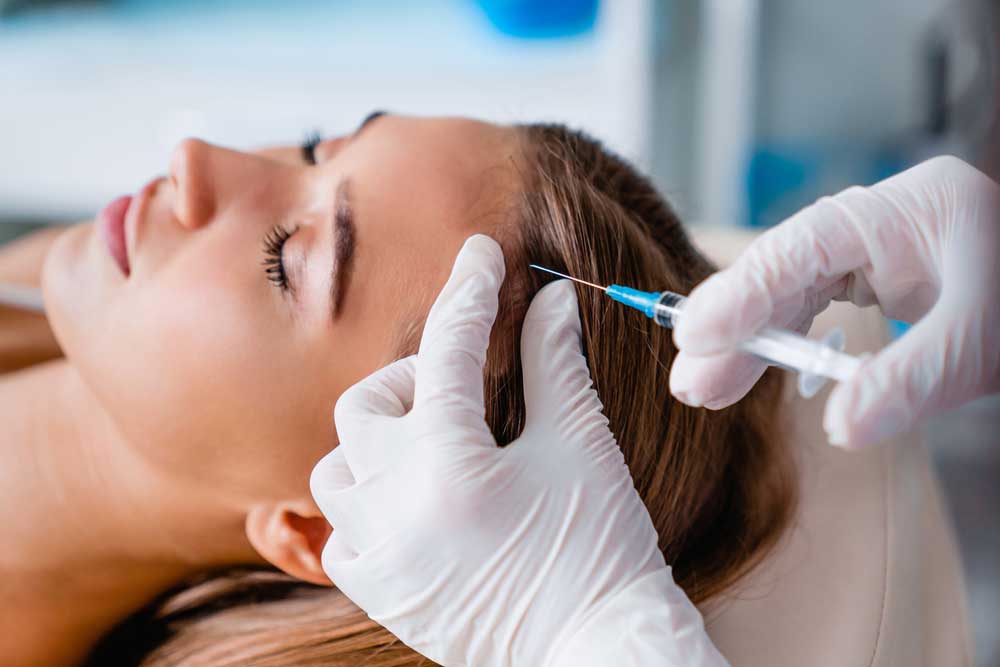In today’s busy world, where most of us struggle to balance hectic work routines and personal lives, it can be challenging to keep stress levels under check. The COVID-19 pandemic has made it only worse by sending stress levels soaring as millions continue to face crises such as unemployment, isolation, financial strains, and overall uncertainty about the times to come.
Can Stress Cause Hair Loss? What’s The Connection?
Can stress lead to hair loss? Yes, studies suggest that stress does impact hair follicles, causing hair to fall out. Factors like physical and emotional stress, injury, and anxiety can trigger hair loss. Incidents like accidents, hospitalization, infection, financial burdens, debt, death of a loved one, work-related issues, etc., are significant contributors to stress.
Fortunately, stress-related hair loss is usually temporary, lasting only for three to six months before your normal hair cycle resumes.
Types Of Stress-Related Hair Loss
There are three main types of hair loss linked to stress:
Telogen effluvium
Telogen effluvium is a condition where stress or trauma causes hair follicles to enter a resting phase. Over several months, these hair follicles fall out when washing or combing your hair. However, this condition is not very severe, and the hair tends to grow back after a few months.
Trichotillomania
Also referred to as hair-pulling disorder, Trichotillomania is a psychological condition in which the individual has a compulsive urge to pull out hair from the scalp, eyebrows, or other parts of the body when under extreme stress or anxiety. Besides stress, this can also be an individual’s way of dealing with uncomfortable, negative emotions such as loneliness, frustration, depression, anxiety, or even boredom.
Alopecia Areata
Chronic stress is one of the primary reasons behind Alopecia Areata, a condition that causes bald patches on the scalp. This is an autoimmune condition that occurs when the body’s immune system attacks the hair follicles.
How Do I Know If My Hair Is Falling Out Due To Stress?
If your daily hair fall is more than the usual 80-100 strands of hair, you might be suffering from stress-related hair loss. If you notice bald patches on your scalp, it may be a sign of Alopecia Areata. If you have had the urge to pull out your hair, it may be stress-induced Trichotillomania.
See Also: What Are the Top-Rated Hair Regrowth Treatments?
How To Control Hair Fall Due To Stress?
There are several ways you can address hair fall caused due to stress.
Over-the-counter, FDA-approved topical solutions and drugs like Minoxidil and Finasteride can help in promoting hair growth and act as treatments for hair loss due to stress. Minoxidil or Rogaine enhances the blood flow and oxygen supply to the scalp, thereby nourishing the hair follicles. Finasteride, on the other hand, is a prescription medication that reduces the conversion of testosterone into dihydrotestosterone (DHT), the hormone that is primarily responsible for hair loss in men. Finasteride stimulates hair growth by bringing down DHT levels.
Massaging the scalp with certain essential oils is also said to be an effective remedy for hair loss. Some examples include lavender oil, castor oil, peppermint oil, rosemary oil, tea tree oil, lemongrass oil, and thyme oil.
Besides addressing hair loss, your stress level needs to be managed too. Relaxation techniques like yoga, exercise, meditation, breathing exercises, and positive thinking can effectively deal with stress. While yoga and meditation calm the mind, exercise releases chemicals like endorphins, dopamine, serotonin, and norepinephrine, which impact your mood and help you manage your stress.
When in stress, it is common to skip meals or indulge in a diet that is not good for your health. However, if you want to control your hair loss, it is imperative for you to monitor your diet and ensure you’re consuming all the essential vitamins and nutrients that promote hair growth. Eat foods rich in zinc, iron, vitamins E, A, B, K, and other proteins that are good for your hair.
Hair Loss Due To Stress – Will It Grow Back?
The good news is that hair loss induced by stress is mostly temporary, and the hair tends to grow back once the stress levels are under control. The correct treatment options, combined with relaxation techniques and a healthy, balanced diet, are the best way to address stress and get it under control. This will not only impact your overall well-being but will also help grow your hair back!
See Also: What Are the Most Common Types of Abnormal Hair Loss Conditions?
How Much Time Does It Take For Hair To Fall Out After Stress?
Hair loss due to stress is said to typically occur three months post a stressful event.
Does Stress Increase DHT?
Yes, high levels of stress are linked to an increase in androgens and increased secretion of DHT (Dihydrotestosterone), a chemical known to induce hair loss.
If you are looking for the best hair restoration treatment options in New Jersey, Dr. Emil Shakov, MD, FACS at the New Jersey Hair Restoration Center is an expert surgeon to consult. Dr. Shakov is a highly experienced, board-certified hair restoration surgeon who trained with the world-renowned Hair Transplant 360 program in FUE and FUT treatments. He holds advanced training and fellowships in aesthetic surgery from the Academy of Procedural Medicine and The American Academy of Aesthetic Medicine.
Dr. Emil Shakov also provides both in-person and video consultations at the New Jersey Hair Restoration Center and is arguably one of the best hair transplant doctors in New Jersey.


